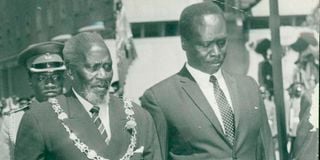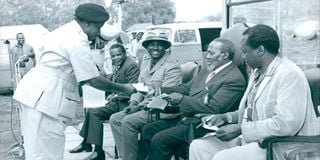In the aftermath of Joseph Murumbi’s resignation, Attorney General Charles Njonjo found himself seated in the rear of President Kenyatta’s stately limousine. As chronicled by Andrew Morton, the biographer of Daniel arap Moi, the conversation turned to the pressing matter of finding Murumbi’s successor.
A familiar roster of power-hungry aspirants was laid before them: Dr Njoroge Mungai, the ever-ambitious Mbiyu Koinange, and the astute Finance Minister, James Gichuru. Yet, as Morton recounts, Kenyatta dismissed each with a wave of his hand. To him, none possessed the stature or the broad national appeal required to transcend tribal loyalties.
Njonjo claims to have suggested Moi’s name. “That’s the man I am going to appoint,” Kenyatta is alleged to have said.
Morton alleges that after Moi was appointed, Kenyatta listened to some of his close associates discussing his choice and he remarked: “You can talk about Moi all you like, but he’s the only one who goes round Kenya and knows the people. You people are just around Nairobi.”
Indeed, Moi embodied that observation, criss-crossing Kenya with boundless energy, his connection to the people unimpeded by the barriers that constrained his rivals. He instantly acquired enemies.
The initial hostility against Moi came from the Kiambu elite, eager to retain the presidency within their district. They also dismissed Moi as a weakling in comparison to the previous holders; Jaramogi and Murumbi. In the Rift Valley, Moi was also the target of radical MPs led by Jean Marie-Seroney and William Murgor who felt that he was bending too far backwards to accommodate the Kikuyu interests.
Political advancement
By then, Moi had become a potential target for plots to oust him. Not only was he vulnerable at the upper echelons of Kenyan politics, but throughout the 1970s he also witnessed a significant decline in popularity within his own Rift Valley homeland. The influx of thousands of Kikuyu families into the Rift Valley, nearly doubling the population, fuelled a growing belief among the Kalenjin that Moi had betrayed his people in exchange for political advancement. This rift within the Kalenjin ranks was eagerly exploited by Moi’s Kikuyu rivals.

Mzee Jomo Kenyatta (left) and Daniel arap Moi.
Photo credit: File | Nation Media Group
The pressure on Moi intensified as efforts mounted to force him into protesting, resigning, or otherwise disgracing himself. According to Morton, the Rift Valley police chief, James Mungai, on at least two occasions brazenly slapped Moi in the face in front of President Kenyatta at State House, Nakuru. Moi’s motorcade was routinely stopped and searched by Mungai’s officers on the outskirts of Nakuru as he travelled either home or to his constituency. Mungai’s men even set up camp near Moi’s farmhouse in Kabarak to monitor his movements, frequently placing roadblocks at night on routes Moi would take from Nakuru.
On one occasion, Moi was summoned to State House in Nakuru for an evening meeting with Kenyatta, but Rift Valley Provincial Commissioner Isaiah Mathenge deliberately kept him waiting. While other groups were allowed to meet with the President, Moi remained in the anteroom, patiently biding his time. When Kenyatta eventually inquired who was still waiting, Mathenge casually replied, “Only Moi.”
During his time as Vice President of Kenya, Moi continued as the Minister for Home Affairs and additionally the Leader of Government Business from 1968.
Police and the Special Branch would openly dupe him like they did after the disappearance and assassination of Nyandarua North MP, J.M. Kariuki. From then, Moi’s supporters were now convinced that he would be the next target of assassins.
“He preferred to travel in police aircraft rather than those of the Kikuyu-dominated Kenya Air Force, and of the tough GSU led by Ben Gethi. In some regions, however, Kikuyu police commissioners refused to give the Vice President official escorts. In other districts loyal police top brass regularly warned him of the threat to his life,” states Moi’s biographer.
At one point the lucrative police and immigration docket was taken away from him.
By late September 1976, the challenge to Moi’s authority erupted in the open. At two grand rallies, one in Nakuru on 26 September and another in Limuru on 3 October, ministers from the inner circle of the Gema elite called for a constitutional amendment to delete the clause guaranteeing the vice president’s automatic succession. Their target was unmistakable; Moi, whom they deemed unworthy of the presidency, citing both his perceived lack of ability and his ethnic background.
More than 20 MPs attended the Nakuru gathering, including influential ministers such as Jackson Angaine (Meru), James Gichuru (Kikuyu), Paul Ngei (Kamba), and Taaitta Towett (Kalenjin), alongside Njoroge Mungai, Njenga Karume, and several Gusii representatives. At the forefront stood Nakuru powerbroker and Gema Organising Secretary, Kihika Kimani. The rally was further marked by the surprising presence of Jaramogi’s ally, Achieng Oneko, hinting at a burgeoning alliance between the Luo ex-KPU faction and the Kikuyu elite, united by their mutual disdain for Njonjo and Moi; whom they held responsible for their political detentions and persecution.
The movement aimed to leverage these public meetings as a platform to introduce the matter in Parliament, where they intended to propose a constitutional amendment to redistribute power among ministers. Paul Ngei, in no uncertain terms, articulated their agenda when he declared, “If you give me that 90-day period as acting president… I can teach you a lesson and rest assured, it would not be a pleasant one.”
Moi, however, found numerous defenders. Among them were allies like Kibaki and Njonjo, alongside influential bureaucrats Kariithi and Kiereini, all of whom were Kikuyu. The ex-KADU communities rallied in his support, as did many Luhya. Close allies also included coastal leaders such as Robert Matano (Mijikenda) and Shariff Nassir (Arab), as well as Maasai leaders Oloitipitip and Justus ole Tipis. Another significant supporter was Nyachae, who, as Provincial Commissioner for Central Province, leveraged his position to thwart the constitutional amendment group by denying them permits to hold rallies in the province following their initial meeting.
On 8 October, following a whirlwind of fervent organisation, Stanley Oloitipitip convened a press conference, asserting that he had garnered the signatures of 98 MPs opposing the constitutional amendment. Among those listed, he claimed, were 10 Cabinet ministers, including notable figures such as Zachary Onyonka (Gusii), Gikonyo Kiano (Kikuyu), and Daniel Mutinda (Kamba). The leaders of the movement now sought to persuade those who had affixed their names to the ‘Group of 98’ document to retract their support, prompting the Standard to headline on 9 October: “40 MPs Quit the ‘Other Faction.’”
Amid frantic political manoeuvring, the movement culminated in a significant rally in Meru on 10 October, led by Kimani and Gichuru. Speakers included Angaine, Ngei, Karume, and Mungai, all advocating for constitutional change, with a dozen other MPs in attendance. Kimani vehemently criticised a purported ‘shadow government’ operating within the state and drew parallels between their demands and the historical suffering of the Kikuyu during the Mau Mau uprising, denouncing their adversaries as collaborators. Mungai and Ngei similarly intertwined the succession issue with the struggle for independence, asserting that they would never permit Kenya to be governed by someone who had not “fought for freedom.”
Ultimately, everything hinged on Kenyatta’s preferences. Following their third rally, the Change the Constitution leaders presented their case to Kenyatta in Nakuru. However, reports indicate that Kenyatta reprimanded them and expressly forbade them from invoking his name in their campaign. A subsequent rally in Mombasa, which was reportedly to be addressed by Jaramogi, was prohibited by PC Mahihu.
On 11 October 1976, the Cabinet convened in Nakuru and endorsed Njonjo’s ruling, now characterised as “its earlier statement.” The movement had miscalculated Kenyatta’s reluctance to solidify Kiambu’s dominance. Kenyatta’s ambivalence, coupled with Njonjo’s backing and public discontent regarding the establishment of a monarchical system, left Moi firmly entrenched in the vice-presidency when the inevitable transpired.
Ideological differences
In many respects, while the Moi faction later portrayed themselves as the ‘underdogs,’ they were, in fact, the incumbents, with the ‘family’ faction emerging as the challengers. The sentiments of the populace were largely deemed irrelevant, and Kenyatta’s stance on the unfolding crisis remained a mystery, as he typically kept his intentions closely guarded.

Chief Kipkemoi arap Sang of Kericho presents a cheque at State Lodge, Nakuru, worth Sh3,000 to President Jomo Kenyatta for construction of Gatundu Hospital and the Forces Memorial Hospital. Looking on (right) is the vice-president Daniel arap Moi and Rift Valley PC Isaiah Mathenge (second left), and the Governor of the Central Bank of Kenya Duncan Ndegwa.
Photo credit: File | Nation Media Group
In December 1976 through January 1977, the long-standing struggle over Kenyatta’s succession gained a new momentum as the ruling party, Kanu, finally held national elections. The elections began at the local level, progressed through sub-branches and branches, and culminated in preparation for the first National Delegates’ Conference (NDC) in a decade. The process split the party into two rival factions: ‘KANU A,’ aligned with the Kiambu elite advocating for constitutional change, and ‘KANU B,’ backing Moi and his allies. Though ethnicity played a major role, with most Kikuyu, Embu, Meru, and Kamba leaders supporting the Change the Constitution group, both factions endeavoured to create broad national coalitions, even in the absence of significant ideological differences.
The election battle was fierce, with Moi’s team securing victories in key districts like Mombasa and Laikipia, thanks to strong support from his allies Matano, Tipis, and Nathan Munoko. Despite widespread allegations of rigging and electoral malpractice, the pro-Moi forces held their ground. The competition was set to intensify at the national level, where Towett was set to challenge Moi for the vice-presidency of KANU, while Kibaki was to face either Gichuru or Mungai for the chairmanship. Matano, acting as secretary-general, was also expected to face tough opposition from Ngei or Muliro of the pro-constitution-change camp.
The much-anticipated elections, scheduled for 3 April 1977, were abruptly cancelled without explanation, even as delegates had already gathered in Nairobi. Three theories circulated about the sudden postponement: a deterioration in Kenyatta’s health, concerns over electoral chaos due to unresolved delegate lists, or a realisation by the Change the Constitution group that they were poised to lose.
The cancellation prevented the two factions from openly battling for party dominance or Kenyatta’s succession, leaving the state mired in paralysis. Nonetheless, the animosity between the rival camps was palpable. Tensions peaked in August 1977 when Kenyatta’s bodyguard, Wanyoike Thungu, had to intervene to stop a physical altercation between Njonjo and Mungai. The factional strife spilt over into the press, Parliament, and local government, prolonging the bitter power struggle.
On August 22, 1978, time ran out after Kenyatta died in office. Moi’s group, led by Charles Njonjo and Mwai Kibaki, was in charge. They chaperoned a smooth takeover. The rest is history.
Tomorrow: Taming Mwai Kibaki
Source link : https://nation.africa/kenya/news/politics/daniel-moi-s-troubled-reign-as-jomo-kenyatta-s-deputy-4787016
Author :
Publish date : 2024-10-05 15:10:29
Copyright for syndicated content belongs to the linked Source.





